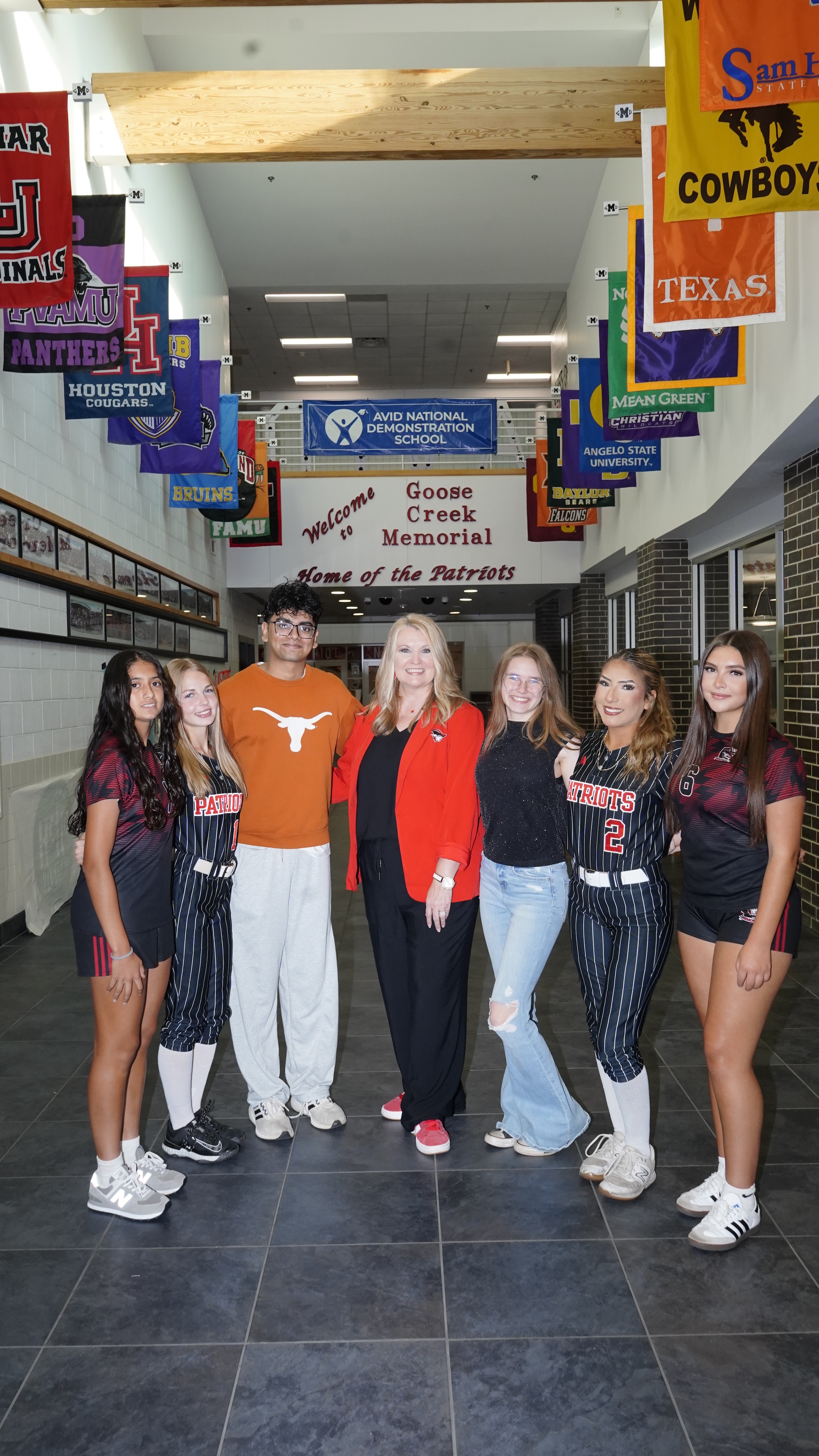Story by: Kendall David, Executive Director of Community Engagement
Goose Creek CISD is proud to announce the 2025–2026 Principals of the Year,
recognizing two outstanding leaders whose dedication, service, and commitment
continue to make a lasting impact on students, staff, and the entire GCCISD community.
Elementary Principal of the Year, Lacey Gordon — Ashbel Smith Elementary
Lacey Gordon, currently in her second year as principal of Ashbel Smith Elementary, has
been a member of the Goose Creek CISD family for the past 12 years. During her time in
the district, she has served as a teacher, curriculum instructional specialist, assistant
principal, and now campus principal.

Lacee Gordon-Elementary Principal of the Year with students. Photo by Carrie Pryor-Newman.
She is deeply committed to student success and community partnership and considers
it a privilege to lead the Ashbel Smith campus.
Under Mrs. Gordon’s leadership, Ashbel Smith has experienced strong academic
growth, rising nine points in STAAR performance following her first year as principal.
This progress reflects her commitment to strong instructional leadership and
continuous improvement.
She has championed impactful practices that support both teachers and students,
including:
- Leading and supporting instructional coaching cycles to strengthen classroom
instruction
- Implementing strategic monitoring systems that promote effective formative
assessment practices
- Serving as a district-level presenter, supporting the professional learning and
development of fellow educators across GCCISD
In addition, Ashbel Smith was recognized as a Healthy Schools Recipient, highlighting
the campus’s commitment to the whole-child approach and student well-being.
Guided by the campus motto, “Every Child Matters; Every Day Counts,” Mrs. Gordon
continues to foster a culture of growth, collaboration, and excellence where students
and staff thrive together.
Secondary Principal of the Year, Kelley Start — Goose Creek Memorial High School
Mrs. Kelley Start, a proud Baytown native, has dedicated her entire 24-year career to
Goose Creek CISD.
Mrs. Start began her career at Sterling High School as a Career and Technical Education
teacher and Sterling Stars dance director. She led the Peer Assistance Leadership (PAL)
program and was a CTE teacher, earning the GCCISD Education Foundation Student
Choice Award and recognition as Sterling High School Teacher of the Year.

Kelley Start-Secondary Principal of the Year with students. Photo by Carrie Pryor-Newman.
Transitioning into administration, she served as the CTE Specialist over the Global
Business Academy at Goose Creek Memorial High School, helping the program achieve
model status through the National Career Academy Coalition. She later served as
Assistant Principal over Special Programs and Testing and most recently led Stuart
Career Tech High School as principal, fostering a culture of innovation and student
success.
As principal of Goose Creek Memorial High School, Mrs. Start has done an outstanding
job creating a cohesive, goal-focused campus culture grounded in compassion,
professionalism, and high expectations for both students and staff. She has
implemented systems that empower students to take ownership of their learning
through academic trackers that allow them to monitor and assess their own progress.
Under her leadership, Goose Creek Memorial has expanded opportunities that prepare
students for life beyond graduation, including increased participation in Dual Credit
courses, associate degree pathways, and College, Career, and Military Readiness
(CCMR) initiatives—particularly through Global Business CTE industry certifications.
Campus performance reflects this focused work, with double-digit growth in Domain 1
benchmark performance data, demonstrating measurable academic progress.
Mrs. Start brings passion and experience to promoting academic success, supporting
staff, and creating a positive and inclusive environment for all students.
Congratulations to Mrs. Gordon and Mrs. Start for exemplifying leadership excellence
and for making a difference in the lives of our Giants every day.